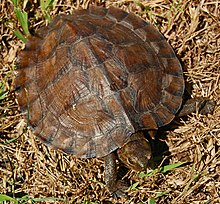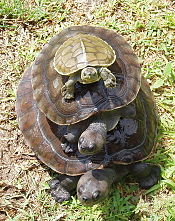Asian leaf turtle
| Asian leaf turtle | |
|---|---|

| |
| Scientific classification | |
| Domain: | Eukaryota |
| Kingdom: | Animalia |
| Phylum: | Chordata |
| Class: | Reptilia |
| Order: | Testudines |
| Suborder: | Cryptodira |
| Superfamily: | Testudinoidea |
| Family: | Geoemydidae |
| Genus: | Cyclemys |
| Species: | C. dentata |
| Binomial name | |
| Cyclemys dentata (Gray, 1831) | |

| |
| Cyclemys dentata range map | |
| Synonyms[3] | |
| |
The Asian leaf turtle (Cyclemys dentata) is a species of turtle found in Southeast Asia. They are quite common in the pet trade; their carapaces resemble that of a Cuora amboinensis hybrid.
Feeding
This species is omnivorous and feeds on vegetation and fruits, as well as mollusks, crustaceans, and fish. It is also known to be a scavenger and very often seen to take carrion. [citation needed]
Behavior
The Asian leaf turtle is quite elusive and sighting is uncommon.[4] It is not strong swimmer preferring instead to walk on the bottom of a body of water rather than swimming freely. According to Das, the adult spends its nights on land and moves to water during the day.[5] It will squirt its digestive system contents when it feels threatened.[6]
Size
Asian leaf turtles can grow 6 to 9.5 inches (15 to 24 cm) long and 4.5 to 6.5 inches in width.[citation needed]
Distribution
The turtle can be found in North India, North-east India (Manipur), Bangladesh, Myanmar (Burma), Thailand, Cambodia, Vietnam, West Malaysia, Indonesia (Sumatra, Java, Borneo, Bali), Philippines (Palawan: Calamian Islands etc.), and China.[7]
This species is found up to 1,200 m of elevation, but the depth range is unknown.[8]
References
- ^ As-singkily, M.; Guntoro, J.; Kusrini, M.D.; Schoppe, S. (2021). "Cyclemys dentata". IUCN Red List of Threatened Species. 2021: e.T195849722A2929066. doi:10.2305/IUCN.UK.2021-1.RLTS.T195849722A2929066.en.
- ^ "Appendices | CITES". cites.org. Retrieved 14 January 2022.
- ^ Fritz Uwe; Peter Havaš (2007). "Checklist of Chelonians of the World". Vertebrate Zoology. 57 (2): 220. doi:10.3897/vz.57.e30895. ISSN 1864-5755.
- ^ "Asian Leaf Terrapin – Cyclemys dentata". ecologyasia.com. Retrieved 14 January 2022.
- ^ "Cyclemys Care – The Leaf Turtles – Chris Tabaka and Darrell Senneke". chelonia.org. Retrieved 14 January 2022.
- ^ Virata, John (20 October 2015). "Philippine Authorities Arrest 3 For Possessing Threatened Turtles". Reptiles Magazine. Retrieved 14 January 2022.
- ^ "Cyclemys dentata". The Reptile Database. Retrieved 14 January 2022.
- ^ "Cyclemys dentata". Malaysia Biodiversity Information System (MyBIS). Retrieved 14 January 2022.
- Farkas B.; Gyurján I. (1998). "Geographic Distribution. Cyclemys dentata". Herpetological Review. 29 (1): 50.
- Fritz U.; Gaulke M.; Lehr E. (1997). "Revision der südostasiatischen Dornschildkröten-Gattung Cyclemys Bell 1834, mit Beschreibung einer neuen Art". Salamandra. 33 (3): 183–212.
- Gaulke Maren (1995). "On the distribution of Emydid turtles and the Anuran genus Microhyla in the Philippines Asiatic". Herpetological Research. 6: 49–52. doi:10.5962/bhl.part.7986.
- Gaulke Maren; Fritz Uwe (1998). "Distribution patterns of batagurid turtles in the Philippines (Testudines: BataguridaCuora, Cyclemys, Heosemys)". Herpetozoa. 11 (1/2): 3–12.
- Gray, J.E. 1857 Notice of some Indian tortoises (including the description of a new species presented to the British Museum by Professor Oldham). Ann. Mag. Nat. Hist. (2) 19: 342-344
- Gray, J.E. 1864 Observations on the box tortoises, with the description of three new Asiatic species. Ann. Mag. Nat. Hist. (3) 13: 105-111
- Gray, J.E. 1873 On the original form, development, and cohesion of the bones of the sternum of chelonians; with notes on the skeleton of Sphargis. Ann. Mag. nat. Hist. (4) 11: 161-172


